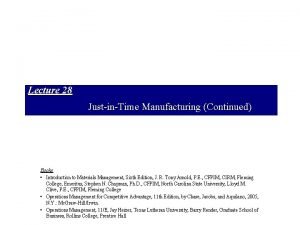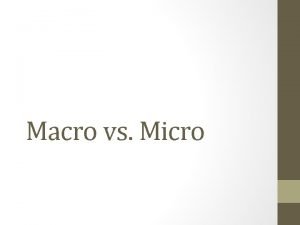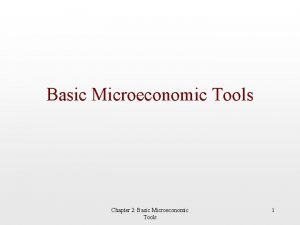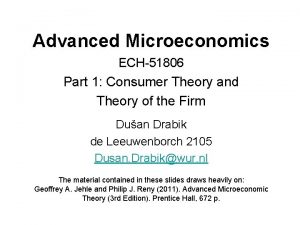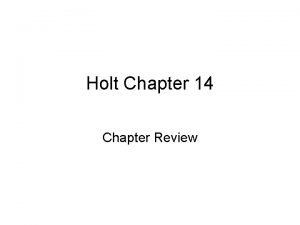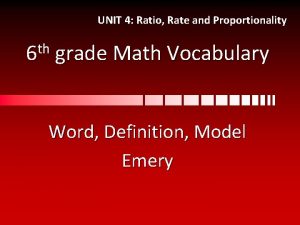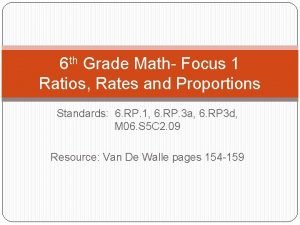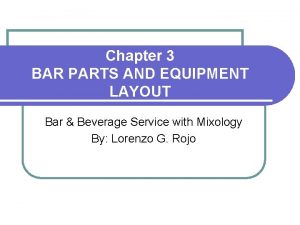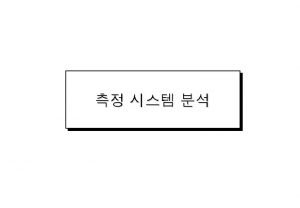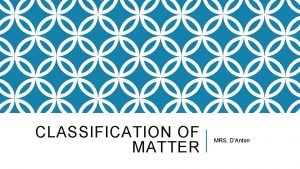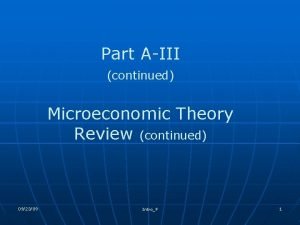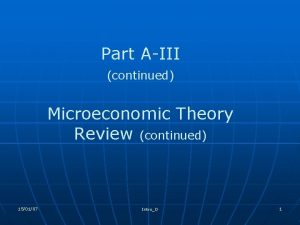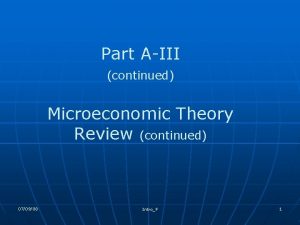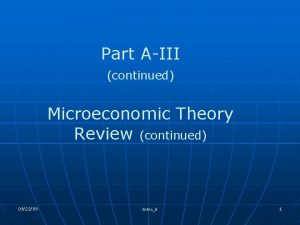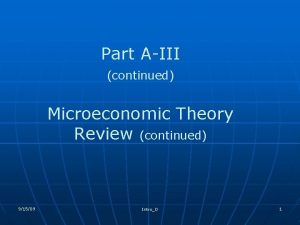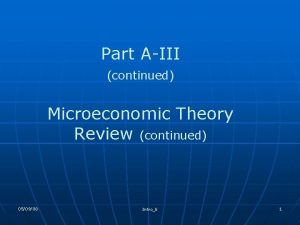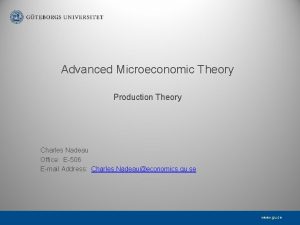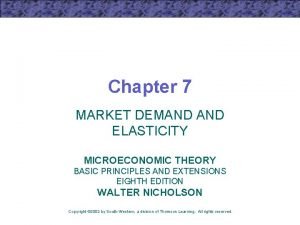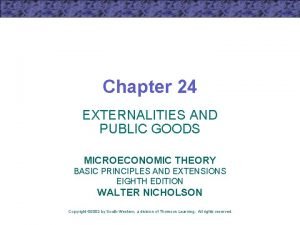Part AIII Microeconomic Theory Review 9609 IntroC 1
















- Slides: 16

Part A-III Microeconomic Theory Review 9/6/09 Intro_C 1

Positive Science, Normative Analysis and Policy Development In this section 9/6/09 n Economics as a positive science n Normative analysis n Policy development Intro_C 2

‘At the most general level’ n Economics is a positive science n Society has normative goals n 9/6/09 Economics can help make policy proscriptions nonetheless Intro_C 3

Economics as a positive science n n Positive Science: An analytical approach is said to be positive if it represents an attempt to describe and/or explain some phenomenon. This description and/or explanation should be independent of the personal value system of the scientist. 9/6/09 Intro_C 4

n n 9/6/09 An economist should be working towards a description and understanding of what is The results of the economic analysis should be independent of what the particular economist believes should be (free of the economist’s personal ethics or values) Intro_C 5

n n n It is difficult for social scientists to remain as objective as is required of a positive science It is important for a scientist to make explicit any normative (personal values) that enter into his/her analysis Example: if a social scientist is hired as a consultant by, or has some relationship with, a ‘special interest’ group, then this should be known to all before they begin to discuss their area of expertise 9/6/09 Intro_C 6

Normative analysis n n n Normative analysis is concerned with what ought to be. It is by definition premised on some set of personal values or social standards Values are essentially a personal characteristic, sometimes shared across members of a society 9/6/09 Intro_C 7

n The development of such values, standards or criteria represents normative studies n Philosophy, Theology, Civics n It is important that society (political/social systems) work towards the development of normative objectives (consensus ? ) 9/6/09 Intro_C 8

n n n To make a meaningful contribution to social debate, economics must at times ‘cross the line’ and become a normative science Example: the use by economists of ‘normative’ concepts of efficiency Economic efficiency criteria are used by economist but they do represent a particular value system (Pareto, Kaldor-Hicks Efficiency)? ? 9/6/09 Intro_C 9

Policy development n n Society (an individual member or group within the society) decides on some particular normative objective Positive science is applied in order to achieve that objective 9/6/09 Intro_C 10

n n Policy can be thought of as a set of rules to be applied in order to attain a given objective It is through positive science that we can develop the ‘best’ (most efficient) ‘set of rules’ 9/6/09 Intro_C 11

An Example of policy development in action: Child Labour Laws Firstly, some sort of ‘normative’ analysis would be necessary n Is child labour desirable or undesirable? n What exactly constitutes child labour (what age, hours of work, etc. )? n Are we only concerned with child labour in Canada? n and so on 9/6/09 Intro_C 12

Secondly, ‘positive’ economic analysis can help answer relevant questions n Where does it occur? n How wide spread is it? n n n Why does it exist in some countries, industries or firms and not others? How does it affect the individuals involved (children, families, firms, consumers)? and so on 9/6/09 Intro_C 13

Finally, given the ‘normative’ objectives of society (what we like and do not like about child labour) and the results of ‘positive’ analysis of the phenomenon: What should the our policy on child labour be? What is the optimum policy (set of rules - laws, regulations, public information programs, etc. ) that best attains the ‘normative’ objectives of society? 9/6/09 Intro_C 14

Policy development Consensus? Unintended Consequences? It is not easy 9/6/09 Intro_C 15

Policy development Exercise – consider obesity First – do the ‘normative’ analysis – What are the issues of concern? What does society want to do? How would you deal with this if you were a politician? Second – do the ‘positive’ economic analysis – what are the relevant questions? How would you answer them? Finally, given the ‘normative’ objectives of society (what we like and do not like about obesity) and the results of ‘positive’ analysis of the phenomenon: What should the our policy on obesity be? Product labeling, taxes, ban on displays of fast food … Unintended Consequences? 9/6/09 Intro_C 16
 Kanban microeconomic theory
Kanban microeconomic theory Example of microeconomics
Example of microeconomics Microeconomic effects of inflation
Microeconomic effects of inflation Microeconomic concepts
Microeconomic concepts Microeconomic
Microeconomic Microeconomic
Microeconomic Chapter review motion part a vocabulary review answer key
Chapter review motion part a vocabulary review answer key Part whole model subtraction
Part whole model subtraction Unit ratio definition
Unit ratio definition Brainpop ratios
Brainpop ratios What is a technical description?
What is a technical description? Components of a bar
Components of a bar The phase of the moon you see depends on ______.
The phase of the moon you see depends on ______. Part to part variation
Part to part variation Civics360.0rg
Civics360.0rg Classification of matter vocabulary review
Classification of matter vocabulary review Uncontrollable spending ap gov
Uncontrollable spending ap gov
